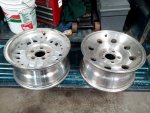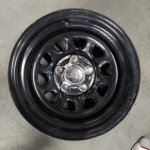With an aluminum wheel the style can make a lot of difference in the weight. A better comparison would be the weight difference between a cast and forged wheel with the same style and size.
I will go ahead and tell you that there is a much more important difference than weight, it's strength. Due to the way a forged aluminum wheel is made it is denser than a cast aluminum wheel, this increased density makes the wheel much stronger. Until recently I didn't know about the differences in aluminum wheel manufacturing, until recently I hadn't needed to. With a larger sidewall tire like most of us run with our 15" wheels on our trucks the tire absorbs a lot of harsh impact from the road, which pretty well makes up for the weaker cast wheel. Being use to this I though nothing of it with the 17" wheels and low profile tires on my car. When I destroyed two factory wheels I blamed it on crappy weak side wall tires that came on the car stock, though nothing of the wheels being cast and weaker. So when I installed aftermarket wheels and tires (also 17" with same size tire) I did not occur to me to check the manufacturing technique used. Well one year later I paid the price for it with another dead cast aluminum wheel. The breakage on both the stock and aftermarket wheels were almost identical. I'll try to post a pic up tomorrow, it is on my cell phone and I should have been in bed at least 4 hours ago.
Out of curiosity exactly what tests have you performed? I wouldn't call weighing the wheel a test. I also don't know what difference you would expect to find weighing them between now and March.















